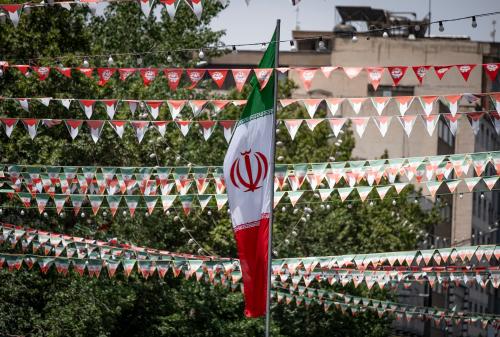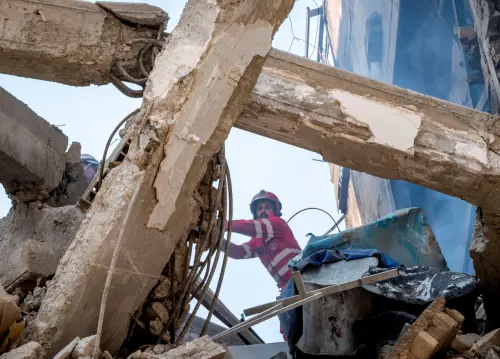On June 21, the U.S. military carried out a series of coordinated strikes against several Iranian nuclear facilities. The attack marks a major shift in the United States’ Middle East policy. Below, Brookings experts break down what the operation means for the region and the world.
For Iran, Russia is neither an ally nor a mediator
The Russian Foreign Ministry’s condemnation of the first Israeli strike on Iran was severe and even furious; the follow-up U.S. strike was also condemned, but in much more measured expressions. One characteristic omission from the stream of official Russian discourse and expert commentary is a reference to the treaty on comprehensive strategic partnership, which Russia and Iran signed in January 2025. Moscow has no intention to provide any material support to Tehran, which has helped Russia overcome its disadvantage in drone warfare by exporting hundreds of Shahed-136 drones, now mass-produced at the Alabuga plant in Tatarstan, Russia.
President Vladimir Putin has distanced himself from any direct involvement in the air war in the Persian Gulf, although he offered to assist in mediating a resolution. U.S. President Donald Trump firmly rejected this, which apparently so surprised Putin that the conversation is not registered in the Kremlin’s official log. No one wants Putin to mediate: Iran, irked by Russian duplicity, did not request it; Israel, angry about Russia’s declaratory support for Iran, would not accept it; and it’s nonsensical for Trump, who entrusts such delicate missions only to his special envoy, Steve Witkoff. Russia’s credibility with most key actors in the Middle East was curtailed by its failure to prevent the spectacular collapse of its key ally, the al-Assad regime in Syria, in December 2024; the shocking defeat of the Islamic regime in Iran has erased what was left of it.
Will the Israeli and U.S. attacks spur or impede proliferation?
Many commentators have asserted that the Israeli and U.S. attacks against Iranian nuclear facilities will have profound implications for future efforts to prevent additional states from acquiring nuclear weapons. But they differ on whether the attacks will spur or impede proliferation.
According to some analysts, the attacks will trigger a decision by the Iranians to produce nuclear weapons as the only way to ensure their security and their regime’s survival; Saudi Arabia and perhaps other regional states will seek to follow suit; and non-nuclear states worldwide that feel threatened by nuclear-armed adversaries will pursue their own nuclear deterrents.
According to some others, the attacks will block Iran’s pathways to nuclear weapons and convince it to abandon the quest; Middle Eastern states will have reduced incentives to seek their own capabilities; U.S. allies will be more confident of Washington’s willingness to use force on their behalf and less inclined to go nuclear themselves; and countries contemplating a nuclear program will be discouraged by the risk of becoming the target of preventive military attack.
Of course, much will depend on the outcome of the Iran nuclear issue. If Iran abandons its nuclear ambitions convincingly, the global nonproliferation regime will be reinforced. But if Iran’s nuclear program survives the attacks and Iran proceeds to build nuclear weapons—or if the result of the attacks is an uncertain, open-ended cat-and-mouse game, with Iran’s program no longer monitored by the International Atomic Energy Agency and the United States or Israel ready to use force whenever it sees evidence of a revitalized nuclear weapons effort—the implications for nonproliferation will be very damaging.
Military means alone cannot ensure a positive outcome. A highly restrictive, rigorously verifiable, and permanent agreement offers the best hope for an outcome that can reduce the likelihood of further nuclear proliferation.
U.S. strikes on Iran have made a deal less likely
Iran may eventually return to the negotiating table, but both the Israeli and U.S. strikes have made it less likely that a deal will be reached. From Iran’s perspective, Israel and the United States used negotiations to deceive Iran—with Israel preempting scheduled talks for Sunday, June 15, by attacking on Friday, and Trump giving Iran two weeks to negotiate, only to then attack three days later. Those deceptions have undermined what little trust Iran may have had in its interlocutors to negotiate in good faith.
Moreover, both Israeli Prime Minister Benjamin Netanyahu and Trump expressed some desire for regime change in Iran. The Iranian regime thus cannot be sure that abandoning its nuclear program would be enough to stop Israel and the United States from attacking again. Iran may well calculate that the best path to preserving the regime would come from getting a nuclear weapon, which might create deterrence like in North Korea. In short, while Iran may return to the negotiating table, the strikes have made it more likely that it does so in bad faith—not in a genuine attempt to reach a deal, but instead as a distraction as it attempts to covertly rebuild its damaged nuclear program.
A final reason Iran is more likely to seek a nuclear weapon today is that the 12-day war has revealed its isolation on the global stage. Its proxies in the region are weaker than ever and played almost no role. Meanwhile, Iran’s recent outreach to newer partners like Algeria and Tunisia bore very limited fruit: although both issued harsh criticism of the Israeli and U.S. strikes on Iran, both notably also criticized Iran’s attack on the U.S. air base in Qatar, even if not by name. Increasingly isolated, Iran may well calculate that its only hope for protection now is to obtain a nuclear weapon.
The energy crisis that didn’t happen
Energy impacts from the U.S. strike on Iran are a story of what didn’t happen. Analysts, myself included, were concerned that U.S. strikes could cause a cornered Iran to use its “ace in the hole”—control of the Strait of Hormuz. About 20% of the world’s supply of both oil and liquified natural gas (LNG) travels through the strait on its way to consumers. Iran likely doesn’t have the ability to completely block the strait, and doing so would be suicidal for its own energy exports. But as the Houthis demonstrated in the Red Sea, a few targeted attacks can have outsized impacts—raising insurance rates, diverting shipping, and generally wreaking havoc. Such a scenario could send global energy prices soaring and widen the conflict, drawing in Saudi Arabia and the United Arab Emirates by disrupting the lifeblood of their economies.
None of this happened. A key reason is that no one wants this outcome—it is disastrous for Iran and its neighbors, along with the global economy. As events unfolded, the oil market clearly didn’t expect the worst. On June 22, the price for Brent crude (a global benchmark) briefly exceeded $81 per barrel, but quickly fell again. On June 24, after a ceasefire between Israel and Iran was announced, Brent crude was at about $68 per barrel, less than the price before the conflict.
Implications for Taiwan worth watching
With skepticism of American reliability on the rise in Taiwan, there is an argument to be made that the show of strength from the U.S. strikes on Iran could offer reassurance. It could demonstrate American willingness to use force to back up its friends.
That said, there is a risk in overinterpreting the impacts of America’s strikes on Iran for Taiwan’s security. The two situations are very different. America’s actions against Iran will not have much impact on China’s calculations on Taiwan unless the United States gets bogged down in another military quagmire in the Middle East. Anything short of that outcome would only affect Chinese thinking on Taiwan at the margins, if at all. Beijing believes its current approach to Taiwan of coercion without violence is making progress toward its goal of securing control of the islands.
Even so, there are two implications of U.S. strikes on Iran that bear watching. First, America has been diverting significant military assets from the Pacific theater to the Middle East. A short diversion of assets in support of this military operation is explainable. A longer pattern of such diversions would call into question America’s rhetoric that the Indo-Pacific is its primary theater.
Second, Israel’s precision strikes on senior Iranian leaders and scientists have been lethally effective. Beijing likely will be watching to determine if precision strikes on individual leaders undermine Iran’s political resolve. If so, it could embolden arguments in Beijing about sharpening plans for similar actions against Taiwan’s leaders in the event of a cross-Strait crisis.
Not quite an axis: China, Russia, or North Korea didn’t show up for Iran
The recent U.S. strikes on Iran have served as a revealing test of the much-discussed anti-Western axis—China, Russia, North Korea, and Iran. The muted responses from Tehran’s supposed partners underscore just how shallow that alignment truly is.
At the U.N. Security Council, China condemned the strikes as a violation of Iranian sovereignty and called for an immediate ceasefire. But Beijing stopped well short of offering Tehran anything that might alter the strategic balance. There was no attempt to materially deter the United States or Israel, and little in the way of concrete diplomatic mobilization beyond formal statements. Despite its “strategic partnership” with Iran, China’s ties to Tehran remain limited and largely transactional—anchored in energy access, not strategic loyalty.
Russia, likewise, had little more than rhetoric to offer. And North Korea, though reliably hostile toward Washington, remains strategically irrelevant in the Middle East theater.
In reality, we’re not witnessing the rise of a cohesive anti-Western bloc, but the limits of one. For all the alarm over a coordinated front, these states are not operating in lockstep. They are loosely connected opportunists—united more by shared grievances than shared goals.
This should give U.S. leaders both reassurance and pause. Reassurance, because the much-hyped axis is far from a tightly integrated alliance. But concern, too, because China’s reluctance to help its so-called partners isn’t a sign of weakness—it’s a sign of strategic focus. Beijing is sharpening its military, economic, and technological edge within its own borders and its immediate region. That’s where it sees the real contest with the United States unfolding—not in Tehran, but in the Indo-Pacific. The challenge for Washington isn’t that Beijing will entangle itself in defending Iran or directly join Putin’s wars—it’s that China is investing to shape the regional balance of power where it matters most.
The politics of Trump’s Iran strikes will reverberate around the world
The political context around military action often plays an important role in how other countries react. Allies and adversaries surely paid attention to the politics of Trump’s strikes on Iran’s nuclear sites. The bottom line: even if this operation was militarily successful, the manner in which the Trump administration conducted it raises questions about American decisionmaking, democracy, and civil-military relations that may ultimately harm America’s influence and standing in the world.
The first place observers of U.S. foreign policy usually look for political context is Congress. Many members of Congress rightly decried Trump’s lack of consultation with the legislative branch, which holds the constitutional power to declare war. But that’s not what other countries will notice. Trump’s action followed a long line of presidential decisions to use force without prior authorization. Regardless of whether the strikes were legal, other countries will not be surprised that Trump acted without Congress.
What will surprise them is the chaotic decisionmaking and aftermath, laid bare by Trump himself. The president’s zig-zagging and maximalist posts on Truth Social in the run-up to the attack, his public rejection of intelligence estimates, his insistence that the strikes “obliterated” Fordow before battle damage assessments were in, his attacks on the media for asking questions about the details of the aftermath and the fate of the nuclear program, and his lack of any clear plan for diplomatic action after the strikes, will all get attention in foreign capitals.
Likewise, Secretary of Defense Pete Hegseth’s openly hostile press conference, in which he berated the media for asking further questions about whether Iran might still have enriched uranium and put the chairman of the Joint Chiefs of Staff, General Dan Caine, in an uncomfortable public position, will raise alarm bells about civil-military relations and the state of Pentagon operations. Hegseth’s attacks on the press are especially notable when contrasted with the comments of Senator Lindsey Graham (R-S.C.), one of Trump’s strongest supporters and a longtime Iran hawk who supported the strikes, that he did not think the strikes had ended the threat, adding, “I don’t know where the 900 pounds of enriched uranium exists.”
Allies and adversaries alike will not take comfort that this is a national security operation that runs smoothly or even has regular decisionmaking procedures. They surely believed this before, but there is nothing quite like the actual use of military force to drive it home. Whether that induces caution or invites risk-taking from other countries remains to be seen.
Strait of Hormuz and China's energy security
The conflict’s direct impact on China has been minor because it is geographically far from China and because China’s investment in Iran is limited. During the crisis, China was most concerned about the spillover effect of the conflict to the broader Middle East region, which would jeopardize China’s energy interests. Indeed, Chinese policy experts have been constantly challenged on how China plans to protect its energy interests in the event of a region-wide conflict.
The “12-day” war seems to validate a long-standing Chinese theory about its energy interests being susceptible but not vulnerable to a crisis in the Middle East. The argument is that if there is a major regional conflict that cuts off China’s oil supply, it would trigger a much broader crisis that threatens the collective interests of oil-producing countries and key buyers, making it unlikely and prone to a speedy solution.
The situation came close when the Iranian parliament threatened to shut down the Strait of Hormuz. China saw it as the most irrational proposal: most of the oil shipped through Hormuz is to Asian buyers, not to the United States or Israel, and Iran depends on the strait for its oil export and revenue. For China, to shut down the Strait of Hormuz is to shut down Iran’s own lifeline, which demonstrates the value of bounded interests. Eventually, Iran did not make that choice, which proves to China that its oil interests in the Middle East have some buffers against geopolitical turbulence.
Questions for the Middle East and the Indo-Pacific
U.S. strikes on Iran will hold important implications for the balance of power in the Middle East and the future of deterrence in the Indo-Pacific.
Within the Middle East, regardless of the specific effects of the attacks on Iran’s nuclear sites, the United States and Israel have clearly damaged the program. Situated in the context of Syrian President Bashar al-Assad’s fall, plus Israel’s larger campaign to degrade Iranian conventional military capabilities and crush its proxies Hezbollah and Hamas, the setback to Iran’s nuclear ambitions further elevates Israel as the most powerful military actor in the region, at least for the foreseeable future. What Israel will now do with that dominance is the key question.
This moment of regional reordering could provide an opening for Israel to come to some sort of deal on Gaza, which would be a good thing. But the effect on the relationship with Saudi Arabia, the other major regional power, may be more complicated if Iran no longer seems to be a powerful common enemy and the Saudis start to fear Israeli regional hegemony. And of course, all this would change again if, in the medium to longer term, the strike causes Iran to double down on seeking the bomb.
In the wider world, the U.S. strikes were surely watched closely by U.S. competitors, especially China, though it is probably too soon to know what lessons they will draw. On the one hand, the United States has demonstrated a willingness and capability to boldly intervene on behalf of an ally. This should chasten those in Beijing who may have previously doubted that Trump would take risks in defense of Taiwan. On the other hand, the United States has committed itself to another military project in the Middle East, diverting strategic attention, putting wear and tear on vital platforms, and depleting scarce stockpiles of missile defense interceptors. Especially if the crisis does not wind down as neatly as Trump would like, the strike could thus create the perception, and possibly the reality, that the United States is preoccupied with the Middle East and less than ready to respond to a crisis in the Indo-Pacific. That would weaken rather than strengthen deterrence.
Don’t expect Iran to act as a defeated nation
The United States is now in an undeclared war with Iran. That’s the inescapable outcome of the unilateral American bombing of Iran’s nuclear facilities, even as Trump has been quick to end the operation to prevent turning it into a large active war with Tehran—and as Iran has also been careful to respond in a symbolic, orchestrated way to avoid an expanded fight with America.
Although the full implications of this undeclared war remain uncertain, there are some conclusions that can be drawn. The first is that even the extraordinary power of America’s most advanced weapons was likely unable to end Iran’s nuclear capabilities; an agreement along the lines of the Obama administration’s Joint Comprehensive Plan of Action stands a better chance of minimizing the prospect of Iranian nukes—at the very same time that Iran’s trust of Washington and of international organizations has dramatically shrunk since the war.
The second is about the impact of the U.S. attack—as well as of Israel’s own attacks on Iran’s nuclear facilities—on the Nuclear Non-Proliferation Treaty (NPT) and Iran’s membership in the NPT. These attacks, taking place without serious international pushback, have not only weakened the NPT but also led Iran’s parliament to unanimously pass a bill to halt cooperation with the International Atomic Energy Agency (IAEA), as is required by membership in the NPT, and to consider withdrawal from the treaty altogether, potentially joining Israel as one of the few states who are not part of the treaty. Iran’s incentives have grown not only because Tehran may now be far more interested in acquiring nuclear weapons, but also because of fears that Israel and the United States may have used information provided by IAEA inspectors to learn essential details about Iran’s program and its nuclear scientists, many of whom were assassinated by Israel. The ultimate decisions on these issues rest with Iran’s supreme leader.
Third, it’s wrong to conclude that Iran is now a defeated nation and will act accordingly. The main reason for the American intervention in the first place was that Israel was unable to achieve its objectives on its own, despite being supplied with some of America’s most advanced weapons and with active American assistance in the war. While these systems gave Israel domination of Iran’s skies and inflicted enormous damage on Tehran, Iran’s demonstrated destructive missile capabilities have penetrated nearly every part of Israel, despite a high rate of missile interceptions by Israeli and American air defense systems, making extended war potentially intolerable for Israelis. These capabilities were not overlooked by others, as Iran’s arsenal could endanger American forces in the Gulf and threaten crucial global energy supplies. Iran was badly hurt, but don’t expect it to behave as a defeated nation.
Ripple effects on the Korean Peninsula and the Indo-Pacific
Israeli and U.S. strikes against Iran may have set back Tehran’s nuclear program for now. However, recent missile strikes in the Middle East carry ripple effects to the Korean Peninsula and more broadly in the Indo-Pacific region in two ways.
First, it further complicates the U.S. goal of achieving North Korean denuclearization. With an estimated 50 nuclear warheads and the capacity to produce up to 70-90 nuclear weapons, the lesson for North Korean leader Kim Jong Un is to never give up his nukes. Although Trump stated that his close relationship with Kim will help “get the conflict solved with North Korea,” Kim has rebuffed Trump’s alleged outreach to the regime and indicated little interest in engaging with the United States. Trump is unlikely to conduct similar strikes against North Korea’s much more advanced nuclear program, and Kim has less reason to negotiate with the United States if denuclearization remains on the table.
Second, increasing tensions in the Middle East have led the United States to temporarily redeploy two Patriot missile defense batteries from the Korean Peninsula to Israel. Although the Patriots left for the region in April 2025 during U.S. military strikes against the Yemeni-based Houthi rebels, the uncertainty of the current Israel-Iran ceasefire may require extending the “monthslong” deployment of U.S. assets to the region. The transfer of Patriot batteries in South Korea to the Middle East reflects the strategic flexibility of United States Forces, Korea, but it also underscores limited U.S. resources to address simultaneous conflicts in multiple theaters. As the Trump administration visibly boosts its presence in the Middle East, it will request Seoul, Tokyo, and other Asian capitals to pick up the slack in shoring up deterrence on the Korean Peninsula and support U.S. defense priorities in the Indo-Pacific.
The Brookings Institution is committed to quality, independence, and impact.
We are supported by a diverse array of funders. In line with our values and policies, each Brookings publication represents the sole views of its author(s).

















Commentary
The global implications of the US strikes on Iran
Brookings experts weigh in
July 1, 2025